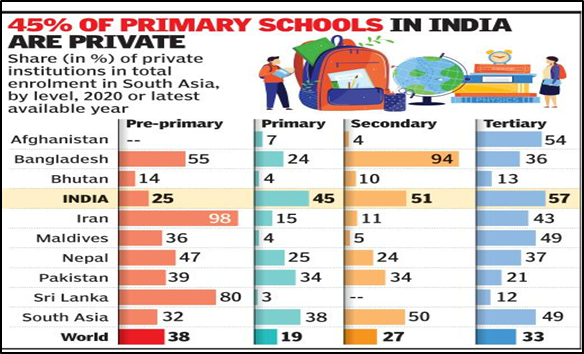- According to the UNESCO’s recently released Global Education Monitoring Report 2022, South Asia has undergone tremendous education expansion in the last 30 years, surpassing the rest of the globe.
- While India is driving these regional averages, 7 of every 10 new schools built in the last eight years in India have been private independent institutions.
What’s in today’s article:
- About the UNESCO
- About the Global Education Monitoring Report
United Nations Educational, Scientific and Cultural Organization (UNESCO):
- It is a specialised agency of the United Nations (UN), headquartered at the World Heritage Centre in Paris, France.
- It was founded in 1945 as the successor to the League of Nation's International Committee on Intellectual Cooperation, aimed at promoting world peace and security through international cooperation in five key program areas -
- Education; Natural sciences; Social or human sciences; Culture; Communication/information.
- It has 193 member states and 12 associate members, as well as partners in the non-governmental, intergovernmental and private sector.
- UNESCO is governed by the General Conference, composed of member states and associate members, which meets biannually to set the agency's programmes and the budget.
- UNESCO is a member of the United Nations Sustainable Development Group.
- Thus, UNESCO's programmes contribute to the achievement of the SDGs defined in the 2030 Agenda, adopted by the UN General Assembly in 2015.
Functions
- UNESCO funds projects that promote literacy, technical training and education, science, independent media and press freedom, regional and cultural history preservation and cultural diversity.
- UNESCO's activities have expanded over the years. g., it aids in the translation and dissemination of world literature, assists in the establishment and protection of World Heritage Sites of cultural and natural importance, works to bridge the global digital divide, etc.
- To accomplish its basic aims, UNESCO has created a number of initiatives and worldwide movements, such as Education for All.
- It also publishes the Global Education Monitoring Report.
The Global Education Monitoring (GEM) Report:
- Launched in 2016, GEM Report is an annual editorially independent report, hosted and published by UNESCO.
- Previously titled the Education for All Global Monitoring Report (to keep the global community accountable for their pledges to educational progress), it published 12 Reports from 2002 until 2015.
- It was then renamed and relaunched under a new UN mandate to monitor progress towards the education targets in the 2030 Sustainable Development Agenda and have tracked country progress, highlighted critical challenges and become an invaluable part of the international education architecture.
- The year 2022 marks the 20th anniversary of the GEM Report.
Highlights of the GEM 2022 with focus on India:

- Roughly a third of students in India are in private schools that receive no state help, highlighting the fact that non-state actors are heavily involved in all aspects of education systems in South Asi
- 67,000 of the 97,000 schools established since 2014 have been private and unaided.
- Approximately 29,600 unrecognised schools educating 3.8 million children in 2020.
- Over 500,000 students are educated at an estimated 4,139 unrecognised madrasas in India.
- Only 46% of adults thought that the government bore primary responsibility for delivering school education, the lowest number among 35 middle- and high-income countries.
- Furthermore, there has been a significant increase in the rates of private tutoring in India, with 61% of secondary school students reporting that they sought tutoring owing to low schooling quality.
- While regulations prohibit teachers from instructing their own students, no licensing or registration is currently required to establish a private tutoring business.
- The main choice criteria of a school by parents included English-medium instruction, schools’ ability to provide classes beyond pre-primary, proximity to home and education quality proxies such as school reputation.
- Inadequate supply and quality of public education, combined with parental aspirations, have driven private education growth in India.
- According to the report, expanding access to education through non-state provision is inequitable.









